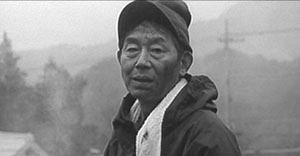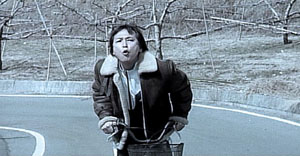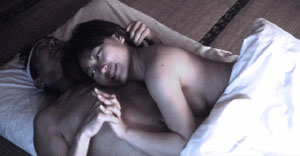While I’ve always been one to stand up and defend Pinky Violence and early Pink Eiga from directors like Koji Wakamatsu as being so much more than just soft-core films, I’m not completely innocent in making that assumption  about modern Pink Eiga from the mid-90’s and on. Outside of films directed by Hisayasu Sato, the smattering of Pink Eiga I’ve seen from that era have been cheaply made, with the smallest semblances of stories just to make things appear like they have bigger ambitions than just being porn. I’ve said before I’m not afraid to admit when I’m proven wrong, and Daisuke Gotô has done just that with A Lonely Cow Weeps at Dawn, an artistic, emotional Pink Eiga that truly transcends the boundaries of the genre.
about modern Pink Eiga from the mid-90’s and on. Outside of films directed by Hisayasu Sato, the smattering of Pink Eiga I’ve seen from that era have been cheaply made, with the smallest semblances of stories just to make things appear like they have bigger ambitions than just being porn. I’ve said before I’m not afraid to admit when I’m proven wrong, and Daisuke Gotô has done just that with A Lonely Cow Weeps at Dawn, an artistic, emotional Pink Eiga that truly transcends the boundaries of the genre.
Noriko is a young widow who lives on a farm with her senile father-in-law, Shukichi. Among Shukichi’s favorite activities is milking his cows each morning, especially his favorite named Bessie, who he’s had for some time. When Bessie dies of old age, Noriko takes it upon herself to get up early each morning, strip naked, and go into Bessie’s pen, allowing Shukichi to milk her, oblivious to the fact that the real Bessie is dead. This also satisfies Noriko, as since the death of her husband, she’s fallen in love with her father-in-law.
Times are tough on the farm, as most of the area is being sold off to land developers, and a shady business man named Hajime is attempting to coerce Shukichi into selling his land. Shukichi refuses repeatedly, so Hajime goes to an old flame: Mitsuko, Shukichi’s estranged daughter. Mitsuko returns home after a 10 year absence to attempt to locate the deeds for the land to sell the farm out from under her father. While there, she stumbles onto the strange morning ritual between her father and Noriko as well as experiences first-hand Shukichi’s deteriorating mental state, which threatens to become the final straw in the loss of his land.

A Lonely Cow Weeps at Dawn was a nice wake-up call, showing me that artistic and thoughtful Pink Eiga hasn’t gone the way of the dodo. Owing a lot to insightful genre directors such as Koji Wakamatsu and even an auteur the stature of Yasujiro Ozu, Daisuke Gotô has crafted a film that has far more going for it than the absurd foundation that it’s built upon. Gotô shows amazing ability in writing a screenplay where amidst all of the sex and outlandish behavior, the characters have true weight and multiple dimensions that create an actual connection with the viewer, something very rarely seen in Pink Eiga. The film reminded me very much of Takashi Miike’s generally misunderstood masterpiece Visitor Q, where love and tenderness is discovered through extremely over-the-top actions. While I haven’t seen Mr. Gotô’s earlier V-Cinema work, I’m glad he broke out of attempting to revitalize Pinky Violence series, as this seems to be his real calling.
As I mentioned before, the film owes a lot to the films of Yasujiro Ozu. That’s something I never thought I’d say in reviewing a Pink Eiga, but it’s something impossible to deny here. The theme of getting old and coming to grips with it while the world around you is changing is something Ozu touched on numerous times, and it’s pulled off in A Lonely Cow Weeps at Dawn flawlessly. Themes of forbidden love and familial turmoil are at play as well, with Shukichi’s daughter, who is estranged from him and only decides to return when she thinks she can make a quick buck. But once she integrates herself back into his life, she slowly begins to doubt her past decisions when seeing the condition he’s been left in. In fact, Noriko and Shukichi are the names used for a father and daughter in a number of Ozu’s films like Late Spring and Tokyo Story.
The acting on display in the film is among the best that I’ve experienced in a Pink Eiga. If the production values haven’t swayed you yet on the elevated merits of the genre, than the acting in this film surely will. Horyu Nakamura is excellent as the aging Shukichi, putting forth a wealth of emotions and mannerisms,  perfectly capturing the character and effectively creating someone the viewer can find much sympathy for. Likewise, the tenderness and sweetness in which Ryoko Asagi portrays Noriko is top-notch, even more-so when taking into consideration that from all accounts, the film was among her first jobs acting. The rest of the cast are no slouches either, and I guarantee you’ll find yourself amazed at the caliber of acting chops found on display in the film. Without it, I doubt the film would have had as much impact. Also worth noting is the soundtrack, which is well orchestrated and integrates perfectly with the film.
perfectly capturing the character and effectively creating someone the viewer can find much sympathy for. Likewise, the tenderness and sweetness in which Ryoko Asagi portrays Noriko is top-notch, even more-so when taking into consideration that from all accounts, the film was among her first jobs acting. The rest of the cast are no slouches either, and I guarantee you’ll find yourself amazed at the caliber of acting chops found on display in the film. Without it, I doubt the film would have had as much impact. Also worth noting is the soundtrack, which is well orchestrated and integrates perfectly with the film.
Outside of the influential Pink Eiga films of the 60’s and early 70’s, A Lonely Cow Weeps at Dawn would be among my top picks to recommend serious film fans looking to see what this genre can really offer up when talented people are involved. The sex is on the low side which is sure to be a plus to the naysayers, it’s rich in narrative and acting performances, and is a moving study on growing old and realizing that even true love can sometimes never be fully realized. Call me a freak if you’d like, but a film about a senile old man milking his daughter-in-law is one of the few movies in recent memory that has actually touched my heart. Go figure.
On the complete opposite end of the spectrum from S&M Hunter, PINK EIGA has chosen another amazing example of the genre with A Lonely Cow Weeps at Dawn. The film is letterboxed (non-anamorphic), preserving its 1.78:1 aspect ratio. The print is pretty good and void of any damage, but it all looks a lot older than a film made just 6 years ago. Subs again are burned into the print (complain if you want), and again I found a couple weird changes to appeal to American audiences, like the name of the cow. The subs say Bessie, but the name spoken is actually Hanako. Not really sure why anyone thought this was something important to change.
Extras include two versions of the film's trailer (one cut and one uncut), a slew of trailers from current and upcoming PINK EIGA releases, a short slideshow, the film's original Japanese poster, cast and crew biographies, and a text interview with director Daisuke Gotô. I highly recommend the film itself, so the disc definitely comes recommended as well.
Please feel free to discuss "A Lonely Cow Weeps at Dawn" here, in our forums!

